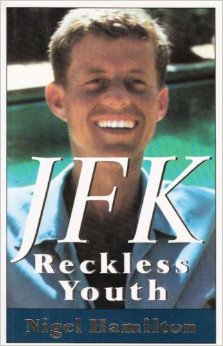'JFK: Reckless Youth'
by Nigel Hamilton
Random House, $30
"This is not a novel to be tossed aside lightly," Dorothy Parker once wrote in a book review, "it should be thrown with great force."
Parker's witticism comes to mind when reading British writer Nigel Hamilton's new, laboriously detailed biography of John F. Kennedy, the first of three projected volumes. It is more than 800 pages of nearly unedited behind-the-scenes glimpses of JFK's childhood and early years through 1947.
In his publisher's promotional material, Hamilton holds himself up as Kennedy's first serious biographer, but his book offers almost precisely the opposite of what a serious biography should be. Rather than any attempt to distill his subject and analyze enlightening evidence from JFK's past, the book instead panders to tabloid-level voyeurism. To Hamilton, every adolescent sexual reference by Kennedy is worthy of reprinting in its immature detail. While this might be fascinating to some, little of it advances Hamilton's analysis of his subject.
However, the sheer mass of detail accumulated by Hamilton is remarkable, and the book provides a wealth of information not previously disclosed. It traces Kennedy's childhood and his experience in England while his father, Joseph P. Kennedy, was President Franklin Roosevelt's ambassador to the Court of St. James. Hamilton details JFK's frequent illnesses, his years at Princeton and Harvard, and his experiences in World War II, including a fascinating recounting of the sinking of PT-109 and Kennedy's true heroism in the rescue of the survivors.
But many of the disclosures seem aimed not so much at illuminating as insulting JFK and his family. Indeed, Hamilton appears to revel in denigrating them, using chapter titles such as "Lobotomy," or "Engaged in Sexual Intercourse."
In one profoundly tasteless passage, he quotes a letter from JFK recalling a Spanish bullfight and his disgust at the crowd's enjoyment of a gored horse "running out of the ring with its guts trailing." Abruptly, astonishingly, Hamilton comments: "That he himself would be shot in front of southerners of his own country, and be driven from the place of his assassination with his own brains trailing, to the applause of many who hated him, was something he could not foresee."
It is difficult to imagine how Hamilton could think, much less publish, such a jarringly inappropriate comparison. It is even more remarkable that Random House left it intact.
JFK himself fares rather well compared with the remainder of his family. Rose Kennedy is roundly attacked as a heartless and cruel mother, hardened by her husband's open philandering. Joseph is singled out for the worst of the attack - criticized, in turn, as a Nazi appeaser, coward, draft-dodger, rapist (of actress Gloria Swanson), and Wall Street cheat.
Hamilton appears fixated on Joseph Kennedy's sexual conduct, even accusing him of abusing Rosemary, JFK's mentally handicapped sister. The charge is based on a single anonymous interview, hardly the hallmark of responsible biography.
Hamilton's attack on the parents lays the foundation for his Freudian analysis of JFK. He charts the future president's intellectual development first as competition with his older brother, Joe Jr., then later as a struggle to break away from his father's dominating influence.
Of course, the book details the young JFK's sexual liaisons, including his relationship while a Navy ensign with Danish-born journalist Inga Arvad, who was suspected by J. Edgar Hoover of being a spy. Hoover's FBI wiretaps documented the relationship, but no espionage.
It must be acknowledged that the Kennedys are hardly as flawless as some might like to believe, and it may well be time to finally confront the myth of Camelot. But serious biography is difficult at such exhaustively close range, and Hamilton's massive effort, undercut by his hostile and sensationalist approach, demonstrates well the pitfalls of such an effort. While it certainly is an accomplishment of compilation, its antagonism and weak editing limit its usefulness as a tool for understanding JFK.
Dorothy Parker's analysis certainly applies; this book should not be tossed aside lightly.
